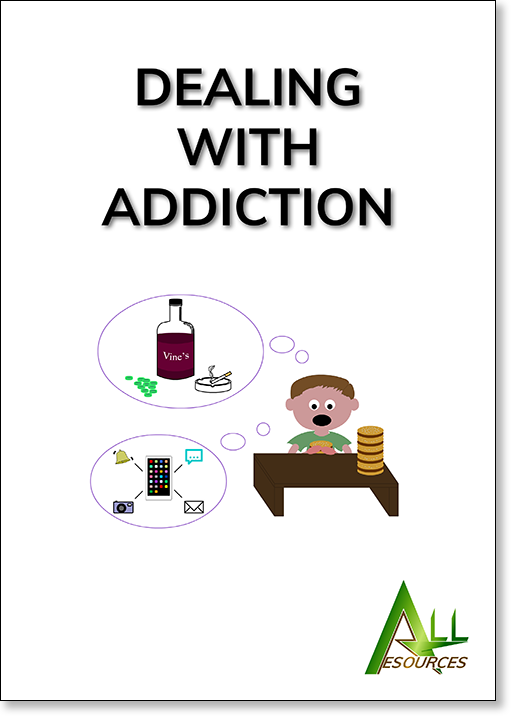Gambling Addiction

Dealing with Addiction
Providing the facts about substance abuse, gambling, gaming & food addiction as well as how to help people recover from addiction.
- Age range: 12 years and upwards
- Category: Schools
- Last revised: 2021
- Pages: 83
- Illustrated throughout
Hard copy: £35.99 add to basket
Gambling addiction is a behavioural addiction. This means there is a compulsion to participate in a non-substance related behaviour. This compulsion rules the addicts entire life and, with gambling, they feel compelled to gamble despite the risks attached.
What is Gambling Addiction?
A gambling addiction is where a gambler is obsessed with gambling. A compulsive gambler will tell you that they are trying to get that elusive ‘big win’, but the truth is, if they do win a large amount, it will simply be gambled away. This type of gambler exhibits a compulsion to gamble no matter how much they win or lose. It is not about the money but it is all about the chase — the ‘fix’ they get every time they place a bet and wait for the results.
No amount of financial loss will stop them from gambling and, until the gambler themselves admits they have a serious problem, the addictive behaviour will continue.
It is also very easy to participate in a variety of gambling activities through online gambling and with the availability of gambling apps which enable gamblers to place bets with the touch of a button.
When Gambling Becomes a Problem
As highlighted above, problem gambling is not necessarily linked to large amounts of money. Many recreational gamblers bet significant amounts, but they stay within their limits and realise it is a form of entertainment. A gambling addict will bet more than they can afford to lose. Gambling becomes an obsession and nothing else matters — not their family, their job, their friends, their home — all they can think about is their next opportunity to place a bet.
Gambling addicts inevitably find themselves at conflict with their family, their employer and their friends. Compulsive gambling can lead to relationship breakdowns because of the lies the gambler tells their partner. Some compulsive gamblers have even gambled away everything they own, including their homes! This leads to feelings of shame and guilt and they often do not seek help until it is too late and they have lost everything.
Gambling Addiction Symptoms
Many of the symptoms of gambling addiction mirror those of other addictions:
- Hiding their gambling or minimising the amount they gambled when questioned.
- Hiding their wallet or mobile phone from close ones.
- Secrecy about their whereabouts and extremely evasive about financial matters.
- Inability to control their gambling.
- Dishonesty — stealing money from family, friends, work colleagues or their employer.
- Getting angry or irritable if they are unable to gamble.
- Mood swings, irritability, short-temper, shame and guilt.


